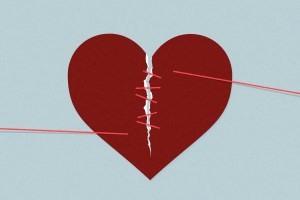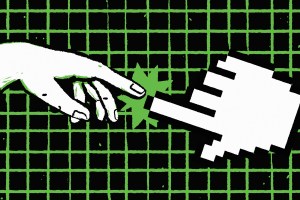
Illustration by Nanette Hoogslag/Ikon Images
How much drinking is too much?
‘Harvard Thinking’ explores the health effects of moderate alcohol consumption
A lot of people like to pour a drink at the end of a hard day. And for years, some research suggested that light to moderate alcohol consumption might yield health benefits. (Heavy drinking, on the other hand, ruins health and relationships.) Yet more recent studies have challenged that idea, raising the question: Is any amount of drinking safe?
“It is indisputable that alcohol does change how cells work,” said Marisa Silveri in this episode of “Harvard Thinking.” She’s the director of the Neurodevelopmental Lab on Addictions and Mental Health at McLean Hospital. “I think when it comes to alcohol, the sober-curious movement has been getting a ton of interest in the media because people are thinking, can I live a sober life and what would that mean?”
Bapu Jena, an economist and physician, said that while we know alcohol affects our health, it’s important to think about tradeoffs. When it comes to drinking, he says, better research would help individuals make more informed health decisions.
“I don’t think as a society we struggle with whether or not heavy amounts of alcohol are good or bad — probably very bad,” Jena said. “I think what people struggle with is, all right, I want to have a glass of wine once a week, four times a week. Is that going to affect my health?”
In this episode, Samantha Laine Perfas, a Gazette staff writer and the host of “Harvard Thinking,” is joined by Silveri, Jena, and bestselling author Emily Oster for a conversation about knowing our limits.
Transcript
BAPU JENA: I think what people struggle with is, all right, I want to have a glass of wine once a week, four times a week. Is that going to affect my health? And again, how much will it impact my health? That really is the core question.
SAMANTHA LAINE PERFAS: For years, it was commonly believed that moderate drinking was safe, in fact, it might even have some health benefits. But recent research has questioned that. So is moderate drinking safe? Is any drinking safe?
This is Harvard Thinking, a podcast where the life of the mind meets everyday life. Today, I’m joined by:
JENA: Bapu Jena. I’m an economist and physician and professor at Harvard Medical School.
LAINE PERFAS: He also co-authored the book “Random Acts of Medicine” and hosts the “Freakonomics MD” podcast. Then we’ve got:
EMILY OSTER: Emily Oster. I’m a professor of economics at Brown University.
LAINE PERFAS: She graduated from Harvard with both an A.B. and Ph.D. in economics, has written multiple best-selling parenting books, and runs the ParentData newsletter. And our third guest:
MARISA SILVERI: Marisa Silveri, associate professor of psychiatry at Harvard Medical School.
LAINE PERFAS: She directs the Neurodevelopmental Lab on Addictions and Mental Health at McLean Hospital. During the pandemic, she did her own experimentation with abstinence and gave up alcohol for 500 days.
And I’m Samantha Laine Perfas, your host and a writer for the Harvard Gazette. Today, we’re going to talk about drinking and whether or not it can be part of a healthy lifestyle.
Let’s talk a little bit about the research. What is it that we know about moderate alcohol consumption?
OSTER: Sam, can I say, when you talk about moderate alcohol consumption, I think you need to say what you mean. So, one version of that is, maybe seven drinks a week, no more than one at a time. And one version of that is 20 drinks a week, no more than three at a time. And I think people would define both of those as moderate, but they’re actually quite different.
LAINE PERFAS: Yeah, and actually, that was a question that I had because in some ways, moderate does seem to be subjective. My moderate is someone else’s more extreme drinking. So how is moderate drinking defined in the research? Does it also change? Is it defined differently in different contexts?
SILVERI: Research-wise, there have been some changes in definition. So talking about being in your doctor’s office, so how much do you drink? You know, they’re looking for the key answer, which is if you are biologically female: one drink per day. If you are biologically male: no more than two drinks per day, per week. And so that’s kind of how you arrive to the, it’s OK to have seven drinks in a week, but if they’re one a day, or 14 drinks in a week, no more than two a day. But then there are also these criteria of how does it impact your life? So when we think about moderate, we think about people who are not just single occasional drinkers. They’re somewhere probably above the seven or 14. You’re probably drinking more than just occasional. And there are probably some consequences.
OSTER: I think that’s a great answer, and in part I think it’s very interesting because when we hear people talk about this, and, in particular when you hear some of the way this gets discussed, I think the idea that drinking, say, one drink a day … that would not be considered moderate drinking, I think many people would say, well, I just heard that ever drinking is bad. That if I have one or two drinks a week, that’s even too much. And so we have this messaging, which I think is quite confusing for people. Some of the rhetoric you hear would suggest that even one drink a week, even two drinks a week is raising your risk of cancer, is raising your risk of heart disease, of liver problems, where I don’t read the evidence as being supportive of negative effects detectable at that level.
LAINE PERFAS: Emily, you’ve actually written about this for The Atlantic. Could you just share a little bit about what you were getting at?
OSTER: The headline on The Atlantic piece was, “Is a glass of wine harmless?” And the subhead is something like, “That’s the wrong question.” And I think the article starts with the evidence about drinking at low levels. And here I’m talking about, say, one glass of wine a day. Quite low levels. The evidence to suggest that is bad for your health is very limited, and I don’t find that evidence very compelling. And what I was trying to get at in that piece is that I don’t think that is the standard to which we will hold this. So in a lot of these discussions, I think what we’re looking for is people saying, it wouldn’t be safe to consume, say, even at very low levels, unless we could prove that there was absolutely no risk. That it was completely risk-free. And unless you can prove that, we should tell people that they should consume nothing. And in fact, I think that there are some reasons that people enjoy alcohol consumption, the same kinds of reasons they enjoy dessert or appetizers or any of the other many things that we engage in in our lives that we’re not doing solely because they improve our health. And then in fact, the question we should ask is, how does the benefit of this compare to the potential cost? And when you frame it like that, for many people drinking occasionally or drinking sometimes is something that they like, that they enjoy, that is a part of their social environment and I think that has value, rather than saying that the standard that we need is, unless it’s healthy, we don’t do it. That’s not the right standard to hold this [to] or really many of the other choices that we make in life.
LAINE PERFAS: Well, and I think that’s where, as a person trying to make decisions in my own life about how much I’m drinking, it’s interesting to hear. Because to your point, Emily, some of the research I’m seeing is like any drop at all, you are making bad choices. So why is it that we’re receiving these mixed messages? What is it about the research that is making this a confusing place to navigate? Bapu, you haven’t said much yet.
JENA: Yeah, I’m not talking because I’m just absorbing all the knowledge that’s … let me say … I got a couple of random ideas. I would just want to pick up on something that you said. You use the words bad choices. In economics, we think about trade-offs. So even if it were the case that very small amounts of alcohol have a negative effect on health, which could totally be the case, it wouldn’t surprise me. If you could, in a large population, a well-conducted study, you might find that very small amounts of alcohol have very small adverse effects on health. To me, that’s a data point, but you have to ask yourself, what is the benefit that people get from consuming small amounts of alcohol? I like to eat ice cream and I know that on average if I eat more ice cream versus less, that’s bad for me, but it generates a lot of utility for me. Almost everything that we do in our life that generates benefit comes at some trade-off. Whether it’s our health, whether it’s time spent with our loved ones and family, whatever it is, there’s always a trade-off. So I think the key question, what you really want to know is, what’s the magnitude? And how much does that matter compared to the benefit that I get?
LAINE PERFAS: One of the reasons that we wanted to do this episode was because anytime we publish anything on alcohol research, it gets a ton of interest. So it does feel like people are trying to answer this question for themselves of how much is too much. Why do you think with alcohol specifically versus ice cream, not that we publish a lot of ice cream research, but it does seem like alcohol is this thing that people keep wanting this definitive answer of: can I or should I not?
SILVERI: Well, one thing I do want to just say outright, you know, when you think about anything … and Bapu, to your point, eating ice cream arguably will change our system. Not sleeping enough; so I decide to binge watch a show and I go to bed at 3 in the morning. Now I’m sleep-deprived. That’s going to have an impact on our neurobiology. There are things we do all the time. And so it is indisputable that alcohol does change how cells work. So I think it’s really important to say, much like some other things, sleep deprivation or exercise or nutrition, it changes how our systems work. And the indisputable part is that if you have your cellular system, you introduce alcohol, it’s going to change the function. That is how we’re programmed. When there is something that requires adaptation, that’s what we do. And that’s amazing. But again, to speak to the trade-off, it comes at a cost. And I think when it comes to alcohol, the sober curious movement has been getting a ton of interest in the media because people are thinking, can I live a sober life and what would that mean? Because I think somewhere we know it impacts us. us.
OSTER: I think the other thing I would say, to this question of why are people so interested in this? I think in general, the sort of relationship between people and alcohol in the U.S. is pretty different than it is in, say, a lot of places in Europe. Uh, if you look at like the distribution of alcohol consumption, the U.S. has a much higher share of people who are abstinent, and then people who drink quite a lot, and that is less true in places in Europe where alcohol consumption has been more a part of the way that people interact around food and just the way that the culture operates. And so I think some of the, almost the legacy of prohibition has generated a relationship that society has with drinking that, for example, will result in people not drinking at all during the week and then drinking 10 drinks at a time on a day on the weekend. And that kind of behavior actually is quite a bit higher-risk than drinking one drink every day because that binge episode we know has many negative impacts, no matter when you’re doing that in the life cycle. That I think is what leads people to question and think about their relationship with alcohol. And I think that’s when people start thinking about, should I be cutting down on this and starting these conversations.
JENA: Sam, let me say two things really quickly. One is, anytime we like to do something in general, it would be ideal if that thing is helpful to us and not harmful to us, right? That’s always true. But I think this is an area where, this is what we’re talking about today, the science has been very influential in shaping the way people think about alcohol. Most of these studies are not very well conducted. You have studies that look at the basic science of the issues like how, what happens to cellular function when cells are exposed to alcohol. But at the end of the day, the body is complex and what you really want to know is, if you took a bunch of people and you randomized them to different levels of alcohol over some period of time and studied the acute and long-term health effects, what would they be? But instead, what you have is these low-quality studies, which just look at people who drink different levels of alcohol and find, for example, that low or moderate alcohol is quote-unquote beneficial or associated with good health. And if those people are wealthier, all you just said is that being rich is good for your health. Which is probably true. A lot of how we think today probably stems from very early research that just built on itself that was low-quality and has got us thinking about alcohol and its relationship with health in a way that may or may not be true.
SILVERI: Well, I think there’s quite a body of literature in the alcohol research field that shows that there are a lot of negative impacts of alcohol on pretty much every organ system. I think that has been long established. And so I just want to make sure that we, I feel like part of my job and my research is to say there is a lot of evidence. There is way less evidence that it’s a positive impact, that alcohol has positives than the negatives. The question is, where do we put ourselves on the scale?
LAINE PERFAS: Marisa, one of the reasons that people might turn to alcohol is to reduce their stress. Is there a value to that in our relationship with alcohol? To turn to alcohol to destress at the end of a hard day?
SILVERI: That’s a good question. Physiologically, when you have a stress response, you have these stress hormones that eat away at our systems. They impact our sleep. They impact all aspects of our functioning. I know a lot of people will say a similar thing, “Oh, I’m going to have a drink because it will help me get to sleep.” Interestingly, neurobiologically, alcohol actually opposes both of those systems. So if I’m of the belief that I’m going to have a drink that’s going to help me wind down, well, maybe the winding down is just that I need to sit down and stop thinking about work. Is it really alcohol that is giving us permission to sit down for a second? I think on some levels, part of it’s a habit, right? If I say, oh, I have a super stressful day, I want to come home, I’m going to have a glass of wine. We’ve created this habitual loop where it is connected to alcohol. Is it actually reducing our stress hormones? It actually doesn’t. There are things that we think we do that become these habitual behaviors that we think are helping us manage. But the question is, how can we make space for ourselves? In a way that doesn’t make us keep that habitual loop going of, ”Oh, now I need a glass of wine to unwind from my stress.” And I really truly think that there’s space between stimulus and response. If there’s the stressor and you’re going to respond with something, maybe it’s a glass of wine or, you know, doing something that one enjoys. How could we play with the space in between?
LAINE PERFAS: As I try to live a healthy lifestyle and make choices for myself that I feel good about, I think alcohol is still one of those things where it’s like, well, it might be really terrible for me, but I also really do enjoy a glass of wine at the end of the day, or going out with my friends. But I have had to ask myself, what is it about having that glass of wine that makes it relaxing? So I’m curious if you guys have thought about this at all.
JENA: I actually don’t know whether small amounts alcohol have any negative effect. I would not be personally willing to make that statement based on what we know of the literature. It’s like P90X, right? We think exercise is good, but if you do P90X and you end up with rhabdomyolysis and on dialysis, that’s a bad thing. And in the extreme, we know things are problematic. It’s useful to step back and say, what are the questions that we struggle with? I don’t think as a society we struggle with whether or not heavy amounts of alcohol are good or bad, probably very bad. I think what people struggle with is, all right, I want to have a glass of wine once a week, four times a week. Is that going to affect my health? And again, how much will it impact my health? That really is the core question. It’s worth asking, all right, what is the increase in liver cancer associated with four drinks a day? That estimate is likely be confounded or … four drinks, four drinks, I apologize, four, mocktails … Four drinks a week. What is that effect size and how does it correspond to driving 50 miles per hour versus 40 miles per hour on the road? The types of risks that we take all the time. How does that correspond to all the other risks that we take in our life? It might very well be small, in which case it’s, you know, probably OK.
OSTER: That was very well said. I think that what’s interesting about the way you ask this, Sam, I think particularly in light of what Bapu just said about what we know about the health impacts of small amounts of alcohol, which are that they are very likely either small or zero. You’re framing it in your mind in a way that’s different than you would frame other choices. So when you go out to dinner with your friends, you don’t think, why do I have to eat here? Why do I have to have an appetizer? Of course, I could go out to dinner with my friends and not eat an appetizer. What’s so great about the appetizer? And the answer is like, when you’re with your friends and everyone’s having an appetizer, it’s nice to also have an appetizer.
And even if the appetizer has a lot of cheese in it and that’s not so good for you or the dessert has a lot of chocolate in and that’s not so good for you, that those are choices that we make because they make our social interactions more enjoyable. And including a drink with that meal may have that same effect. And I’m not sure why we frame it in a way that is different from that, when we’re talking about this sort of level of alcohol consumption, that for you is not causing issues with your functioning in life and also from the health standpoint is minimal.
SILVERI: I think that’s a question that is really on an individual basis, too. After I went through my 500-day abstinence experiment with myself, one of my most enjoyable moments to have a glass of wine is when I’m making dinner. Whether it’s coming home from work or come downstairs from my home office or whatever it is, what I was finding was that even after not drinking for 500 days, would I still feel that pull to want to have a glass of wine. And lo and behold, it was still there. And so I think it’s a really individual question for what people are experiencing. And I agree if, you know, I’m not trying to just be the data person who is so like, no, it will change your cells, that’s the end of the story. There is so much more to it. There really, really is. And so the alcohol question, I think, is a personal one, maybe with not the best data to answer it on a personal basis. But I really like these questions and this dialogue because as a scientist, I’m a scientist who wants to do science for what people need, and I think that the points that you’re both raising and, you know, Sam, to your credit in bringing together a diverse set of people to talk to each other about this, is so important because it’s not just about a cell in a petri dish. Like it’s such a bigger picture. We’re looking for a good or a bad or a stamp of approval. And I don’t know that that can be answered in one black or white way.
LAINE PERFAS: Yeah, it is such a personal choice, and the risk assessment is probably going to look different person to person based on their situation, their overall health, their culture, preferences, all of these different things. So if you guys had to give advice to someone who’s looking at their own life, what’s some advice that you might have for people or questions that they could ask themselves to try to get at those deeper things that might be connected to their relationship with alcohol?
OSTER: So I have a friend named Lucy who’s an internist and I’ve talked to her a bunch about this and how she talks to her patients. And I think that one of the things that we’ve talked about is this idea of some amount being safe, that one drink a day is fine or two drinks is fine if you’re a biological man and that there’s some kind of cutoff, and if you drink less, you’re totally fine. And her view is look, what matters is how you feel about this relationship. And for some people, one drink a day is comfortable and happy. And it’s something that they look forward to and they don’t think about it. It’s not something that’s occupying them. They’re not worried about it. And then there are people who are saying every day, “I think I shouldn’t have this. I don’t want to have it, but I do it anyway,” and then that can be a problematic relationship even at a level below what we would say was an issue medically. So just rather than framing around the idea that there’s some cutoff amount, and below that is fine and above that is a problem, to ask the question, how do you feel about your interaction with this? And use that as the guide. Of course, there’s a level at which it’s problematic even if you feel fine, but at the amount of drinking that we’d be talking about, where the potential health impacts are really quite small, focusing in on how you feel about that relationship rather than about exactly what the number is.
SILVERI: I hear that, and I do think that saying moderate or some scale can be a blunt guideline. Because I think that without some number, even if it’s flawed, it gives people a sense that, listen, I actually had a beer last night that was the equivalent of two beers. So I think that moderate is a good descriptor to give us this categorization or one drink or two drinks. None of it is perfect.
JENA: So I like the approach of your internist friend to be well, you know, it’s personal. And at the same time, there has to be some way that we let people know what we’re talking about. I would actually, if it’s OK, I would punt on that question and say there’s a different question, which is, alright, instead of giving advice to individuals about what and how much they should drink is maybe give some advice to researchers who produce the evidence that is used to have those conversations with people. Which is to say that any study that looks at people, how much they drink and links it to health outcomes, in my view, shouldn’t be done unless there is a rigorous way to do it. Meaning to say either I’m going to directly randomize people to these interventions, which is hard to do for a lot different reasons, or to be creative about thinking about ways in which people might be randomized to different levels of alcohol. And it’s hard to do. It’s not an easy task, otherwise everybody would be publishing these sorts of studies. But it reminds me of the types of studies that look at things like Sunday liquor laws, states and municipalities have different laws about availability of alcohol on Sundays. So you can look at what happens as municipalities introduce these laws at different points in time, in different areas, and look at short-term effects that you could reasonably attribute to alcohol.
And that helps you get at the short-term causal effect of that availability. It doesn’t tell you what happens if you drink one drink per week or four drinks per week, but it’s those types of study designs that I think can get us to better causal estimates about the effects of alcohol.
And then the last thing I would say is it is useful even in these poorly conducted studies where we can, where we think we might be able to assign the direction of the bias to help quantify what those estimated risks are compared to everything else that we do. Because my instinct would be that the risks that we estimate from the literature are probably going to be on par with all sorts of other decisions that we make, and so maybe we’re hemming and hawing about very small amounts of alcohol when the real concern is youth alcohol use or heavy alcohol use, those sorts of things.
LAINE PERFAS: Thank you guys so much for this great conversation.
Recommended reading/listening:
- Is a glass of wine harmless? Wrong question. by Emily Oster
- How do we know if alcohol is bad for us? by Bapu Jena
- Sifting the damage of pandemic-era drinking by Alvin Powell












